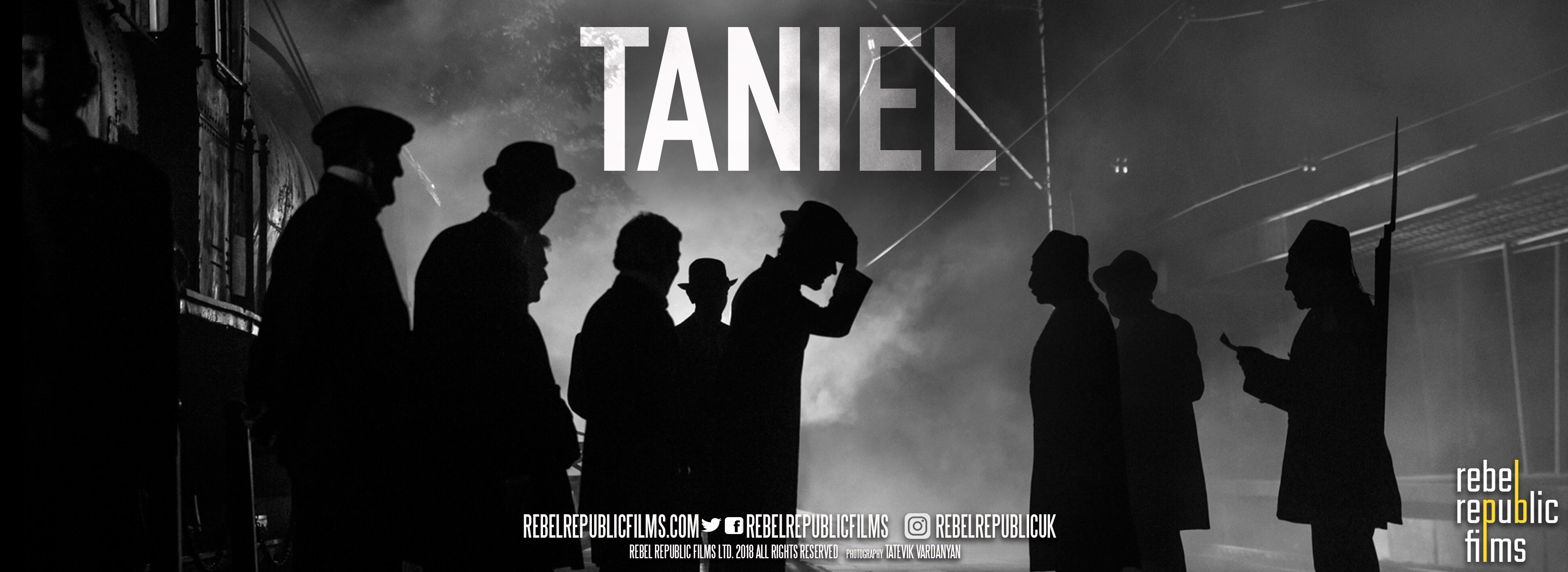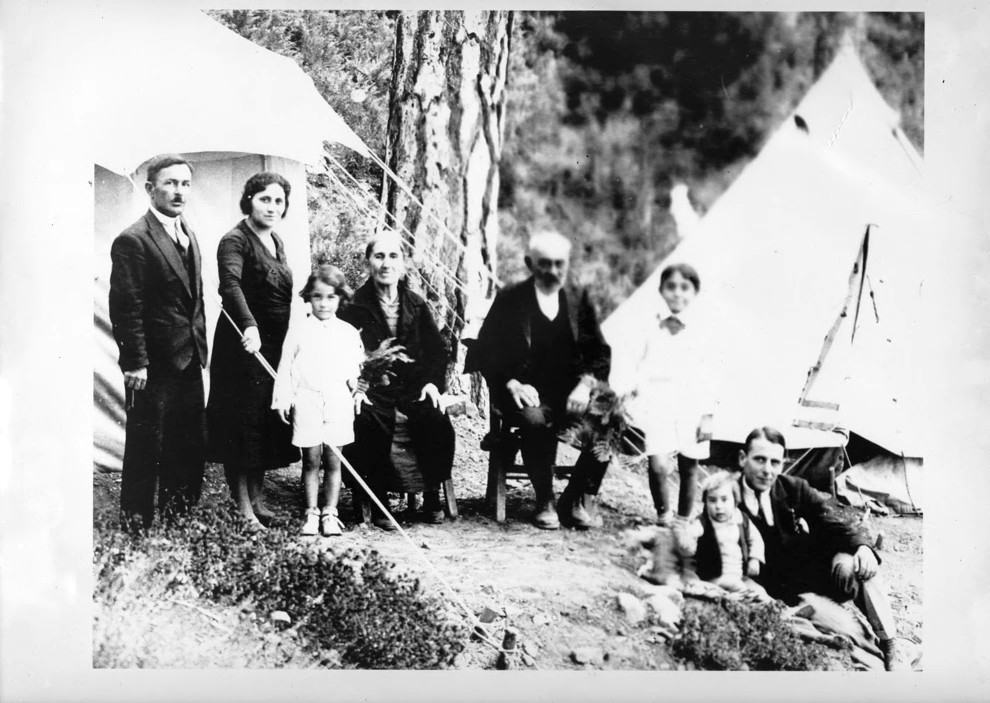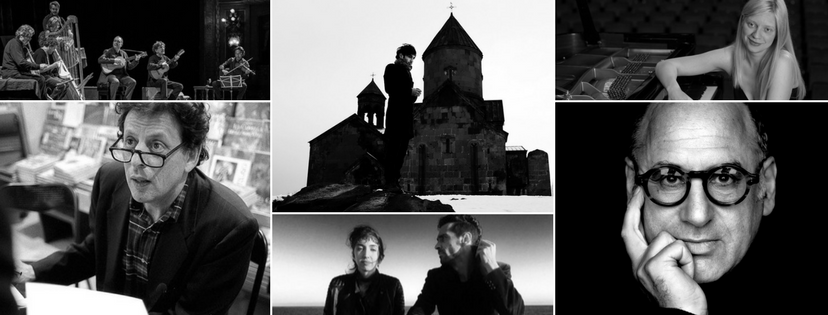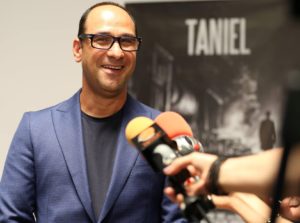
It has been a truly wonderful experience sharing “Taniel” with audiences at festivals around the world. Whether it be at Screenplay in Shetland, Bermuda International Film Festival or at Golden Apricot in Armenia, one question we regularly get asked is, Why did we choose the protagonist for the film, our representation of the Armenian Genocide, to be Taniel Varoujan.
As a filmmaker, I have always been keen to address the subject, especially as my grandparents suffered unimaginable horrors during that period, an indelible imprint that never left them and a situation made even more devastating, when they became refugees for the third time in their lives during the Turkish invasion of Cyprus in 1974.
I always found it difficult explaining to my friends the real impact and damage that such a tragedy has on a person and their family. And thus when thinking about how to approach making a film on the subject, I felt that the suffering of Armenians should be expressed by celebrating the human spirit, the beautiful textural fabric of the individual that often is lost in the facts, statistics and the Turkish Government’s bullying about what word you should call the murder of a race – as though somehow that changes anything.

A few years ago, I read a fascinating book entitled “Exile, Trauma and Death,” by Aram Andonian, a journalist who was arrested alongside hundreds of Armenian intellectuals on April 24, 1915. Andonian was one of the few who survived, and he witnessed the prisoners’ journey to Chankiri prison. Varoujan is fleetingly mentioned in the book, but what was written captivated me about the man. I followed up by looking for scarce English translations of his works, a dozen or so poems, some that had even made the long journey from Armenian to French and then English. I worried about clumsy translations and Chinese whispers, whether the meaning had been changed, but even so, what I read was majestic. Varoujan’s understanding of the beauty of humanity and also the fragility of people, villagers, their land and its spirit was magical, so I wanted to know more. With the help of our poetry producer Tatevik Ayvazyan, we embarked on a journey of research and discovery, constantly grateful to the preservation and survival of the many original publications and the wonderful translations by dedicated lovers of literature like Tatul Sonentz-Papazian and Alice Stone Blackwell.
Varoujan was a supremely talented visionary and inimitable wordsmith. The volume of work he left (four published collections of poems) is very much alive, sounding modern and affecting people today as it did over 100 years ago. His range of poems is stunningly huge – he has intimate, sweet portraits of village life, painful prophecies of the fate of his nation, sensual stories of desire—all of which are united in his love of mankind, beauty and nature.
Varoujan’s Western Armenian is particularly exquisite and vivid, reviving Krapar words, making up his own and playing with the shape and form of the language to mold any image and emotion he wanted to convey. It was important for the film to have his poems which he insisted on calling songs, voiced in Western Armenian, (a language which is sadly classified as endangered by UNESCO) as the only way to keep a language alive is using, hearing and cherishing it, like Varoujan did.
When writing “Taniel,” even though I was funding the project myself, I wanted to be ambitious and create a film that had scale, that was beautiful, shot in black and white in the Film Noir style. As a child, I loved watching reruns on BBC of old Hollywood classics, especially films by the legendary director Rouben Mamoulian and dark comic genius Akim Tamiroff—Armenians who had made it to the highest level of the industry as immigrants in the 1930s which was no mean feat. I was captivated and inspired by them then as much as I am now.
I also wanted the film to be powerful in conveying emotion, for the audience to feel and understand the human story, Varoujan’s pain, our pain, a story that represented all Armenians.
Varoujan was a deeply thoughtful poet, and in the film, we do not see him speak but hear his thoughts through his poems and thus the film’s narrative is mostly in poetry. The original Armenian verses are read by wonderfully talented Istanbul actor Yegya Akgun, who is the voice for onscreen star and one of Armenia’s best theatre actors, Tigran Gaboyan, who embodies the poet silently.
The poems we chose give us a sense of each scene, from arrest to prison and we hear Varoujan’s feelings and emotions while his world is pulled apart. Amazingly, most of these poems were written about his experiences as a young man witnessing the Hamidian massacres, and it is clear that when we talk about the Armenian Genocide, we should understand that the process started in 1894.
It was also important that the film is screened to a global audience. That’s why I wanted a British voice in the film too. We commissioned poetry in English, which was written by Ben Hodgson, telling the story of the film. These verses are the connective glue between each of the scenes. The next challenge was to find the English voice that would have the necessary grit and emotion. In Britain, we are blessed to have so many great actors; I could not have wished to cast anyone more perfect than one of the UK’s most recognized thespians—Sean Bean, the star of Game of Thrones and Lord of the Rings to be our film’s narrator. Not only does he have wonderful gravitas thoughtfully delivered with his South Yorkshire accent, but he also understood the pain and beauty of the story and made challenging dark verses his own, with understanding, passion and respect.
With the need to find appropriate locations a challenge, I first wanted to see if it was possible to film where Varoujan lived. A friend of mine arranged for me to meet with a top Turkish producer Ali, who’s been involved in high-profile productions. While I was waiting for the meeting, my son Aren and I took in the sights. The visit seemed like a pilgrimage. We took a boat ride to the historical Armenian Kinaliada Island and then back on the mainland for the old Byzantium town and Armenian churches.
We wanted to find Taniel’s old home and had been told it was Yeni Nalbant street, most people were unsure about the location or if the house still stood. The area is run down now, and of course there is no plaque or statue to mark the place where one of the greatest poets in the then Ottoman empire lived. Walking up the steep climb, blinded by the setting sun I felt elated and very sad at the same time. To stand in a street where Taniel would have walked, talked and laughed was emotional. Watching the stray cats and dogs running around, I wondered if their feral ancestors would have been here too. Varoujan probably would have greeted them like royalty with his wonderful surreal mind turning their forms into panthers and wolves hiding in the shadows or dancing in the sun, part of the mythical world he inhabited.
Ali the producer opened the door to his beautiful home with a big smile, saying ‘welcome to your home,’ referencing the fact that the district he lived in was mostly Armenian in 1915. I realized as I sat there in his office looking at the grandeur of the past that I was sadly no longer part of this reality. The script I was holding was about a great man, one of the many shining lights put out at the hands of the Ottoman government over 100 years ago.
Ali is a man saddened by the terrible state of his own country and what they have done to others. He was very generous and offered to help me make the film, but it was clear I could not film outside in the open. A production in Turkey that showed Armenians arrested on April 24 in 1915? No. I might have to shoot the prison scene from within my own cell.
So it was off to Armenia and Gyumri, aided by Nare Ter-Gabrielyan, the film’s producer, who was instrumental in the smooth production of the film. The city had amazing historical locations and, most importantly, many creative and talented people. Working with the Gyumri Dramatic Theatre was a real pleasure. Not only were they consummate professionals, but they were a joy to work with, focused on the art of acting and the importance of representing one of our greats.
I feel the film’s strengths are through its cast. The depth of their onscreen performances, expressions and emotions come from our shared history of the Armenian Genocide. This was not something that needed to be directed or discussed.
After five filming days it was back to the UK and work on the title sequence, foley (sound effects), editing, and of course one major element in creating mood, the soundtrack.

We are extremely fortunate to have some of the most talented musicians’ work in the film. The legendary Philip Glass played by Valentina Lisitsa sets the scene. Jordi Savall gives Constantinople its Western Armenian character. The wonderfully talented Tigran Hamasyan and music from the album “Luys i Luso” is the driving force across the film with his beautiful complex and emotive cascade of notes and vocals. The brilliant Michael Nyman sets Taniel free, and Arik Bambir puts down his rock guitar and delves deeper into the rich history of Armenian folk music, reminding us that the human spirit cannot be destroyed by tyrants.
It was incredible to win the Best Short film award at one of Hollywood’s oldest festivals—ARPA—and receive Outstanding Direction and the Audience Award at the faraway Bermuda International Film Festival. However some of our most moving memories are from our recent back to back screenings at the Hrant Dink foundation in Istanbul and Ghent University, places where Varoujan lived and studied.
His life was taken when he was 31 years old. Talking about Varoujan the martyr and Varoujan the icon, the human being behind that image and perception is often forgotten. It was important for us to revive his words of love and tenderness to his wife, his confidence when talking about critics, annoyance at his publishers, and his pain and homesickness when he was away. So both in Istanbul and in Ghent, we had the chance to perform his words live on stage with our actor Yegya Akgun’s clear voice, and it’s impossible to describe our emotions when we heard him reading one of Varoujan’s most poignant poems, “To the Muse,” on his birthday on the street where he lived. We wondered if Taniel, as a young man, would have thought he would be remembered and his words spoken over 100 years later.
Taniel’s journey has been emotional and constantly evolving. Really rewarding is the knowledge that the film has crossed over from the screen to the stage and book publications.
Poetry and letter performances (following screenings) feel like we were going back to what Varoujan himself loved to do for his audience and students. “Taniel” and the poem “Alms” are to be featured in an upcoming publication “Poems From the Edge of Extinction,” an anthology of 50 poems in endangered languages edited by Chris McCabe of the British National Poetry Library in London. After seeing the film, McCabe was affected by Varoujan’s words and was instrumental to make it part of the upcoming publication. After all Varoujan himself believed that…
What do we care life is dying
When the dream is living,
When the dream is immortal.
Ո՛հ, ի՜նչ փոյթ կեանքը մեռնող,
Երբոր երազը կ’ապրի,
Երբոր երազն անմա՜հ է:



After reading this emotional writing by the director Garo Berberian I can’t wait to see the film. Taniel Varoujan, Misak Metsarentz, Krikor Zohrab, Baronian and others of the period were the greatest authors of Armenians. Reading the books of these talented writers in my teens has left a permanent mark in my heart about Armenian poetry, plays, novels. Reading this article I can already feel the films strength, it’s impact. Congratulations Garo Berberian for presenting one of the greats of Armenian poets to the present Armenian generation. that alone is a great accomplishment. Wishing much success for the film and in your future endeavors.
As a diaspora Armenian and particularly a fellow UK Armenian, I felt very emotional when I read about Garo highlighting the short life of Taniel Varoujan.I haven’t met Garo personally but being a Cypriot born Armenian,I have met most of his family both here and in Cyprus.
Amongst others ,Taniel Varoujan was one of the first Armenian writers we were taught about at the Armenian school in Larnaca Cyprus.At a very early age we were made aware of all the talent that was extinguished during the massacres in the latter part of the nineteenth century and the beginning of the twentieth century.
Congratulations Garo and wish you all the very best for all your future endeavors!
Hi Nazaret, many thanks for your message and we are really honoured to be invited by Armenian Weekly to write our article on “Taniel”. It is also wonderful to receive such warm and supportive messages about our film and as someone whose parents are from Cyprus our histories are shared as are all Armenians and it’s important we remember the important positive human things in life. Garo
Thank you Lydia for your comment and yes making the film was an emotional and also euphoric journey and if we manage to inspire or introduce people to one of our greats we are very happy.